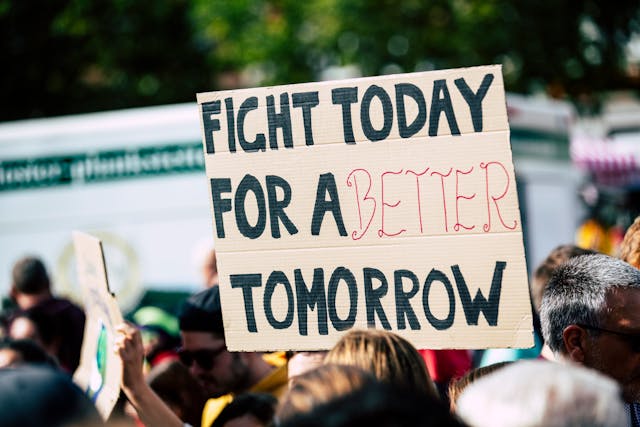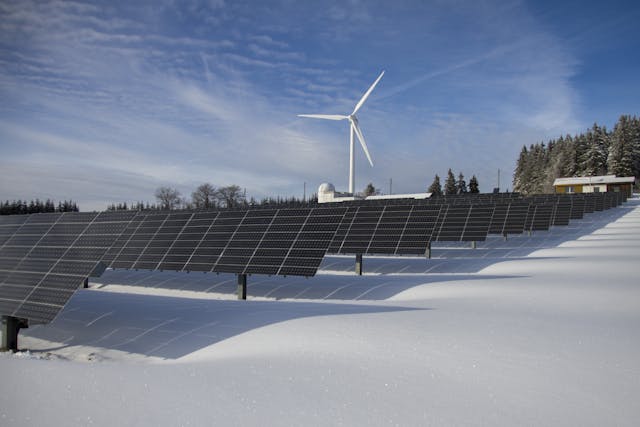If you check the latest research of the Global Monitoring Laboratory on CO₂, you will find a record that shows a rise from 340 ppm in 1980 to almost 425.83 ppm in 2025, marking the sustained growth since the NOAA measurements began. This also means that from 2021 to 2025, there are now 85 more molecules of CO₂ trapping heat. That shift is now what scientists call critical, according to many new books on climate change published in 2025.
Writers like Bill McKibben and Elizabeth Kolbert continue to shape how we understand this emergency. Thanks to them, we also see new conversations from Ayana Elizabeth Johnson and Genevieve Guenther, both frequent TED speakers. And of course, Al Gore, who still stands as a reference point. Based on that, we’ve gathered the titles below. We also took into account popular publishing sources and the book summary app to provide the core ideas and copies to stay up to date on the climate stories shaping 2025.
Top New Books on Climate Change to Read in 2025
We see how scientists point out that we’ve effectively turned up Earth’s “thermostat” by about 1.3°C since the 19th century, according to the NASA Climate Data. It’s a factual climate benchmark, showing how much warming has already happened.
We also see how publishers and media outlets track book releases, and say there are more climate-related books being published in early 2025 than in the same period in 2024. It’s a sign that public interest in the topic is growing fast. So here are standout releases (mostly non-fiction) that we believe can shift your perspective and possibly your actions this year:
1. ‘Abundance’ by Ezra Klein and Derek Thompson
Published in March 2025, the authors argue that many climate and infrastructure goals are being held back by regulatory inertia. This nonfiction title reached #1 on the The New York Times bestseller list. It’s been described as “one of Barack Obama’s favourite books of 2025.” They propose an “Abundance Agenda” to accelerate clean energy:
- If you’re someone who wants big-picture system change, this book gives you the sweep
- It focuses on policy and regulation bottlenecks (moments where climate projects get stuck in paperwork even when we have the technology and money to build)
2. ‘The Joyful Environmentalist’ by Isabel Losada
Published in February 2025, the author argues that caring for the planet doesn’t have to come from exhaustion. She shows that sustainability can grow from small pleasures. If you’re someone who wants climate action to feel real, this book:
- Focuses on daily habits that make sustainability practical: you can cut waste or start repairing things
- It matters as we see how Losada reframes activism through joy: we see the proof that optimism can drive change as effectively as protest
3. ‘Here Comes the Sun: A Last Chance for the Climate and a Fresh Chance for Civilization’ by Bill McKibben
Published in August 2025, this nonfiction book is McKibben’s most direct call yet to speed up the solar revolution. He argues that sunlight and wind are now the cheapest energy sources. If you’re looking for data mixed with story clarity, this book:
- Focuses on how solar and wind power are expanding faster than any energy source in history
- It matters as we see optimism and strategy: proof that clean energy is already underway
4. ‘Birch and Jay’ by Allister Thompson
This is actually a fiction novel (it goes under climate-fiction type) with an engaging story. We also see the future-crisis setting. Published in April 2025, the author tells the story of two people whose lives keep circling back to each other in a small rural town. It’s a quiet reflection on loss and how people rebuilt:
- It focuses on how personal relationships mirror the natural world
- It matters as we see how the author uses human connection just to send us a reminder on what’s at stake in a place that all we call home
5. ‘Life on a Little-Known Planet: Dispatches from a Changing World’ by Elizabeth Kolbert
Published in November 2025, this new nonfiction collection gathers the author’s reports. She writes about melting glaciers, communities that are trying to adapt, and so much more. Her writing stays rooted in fact but never loses the human detail:
- As we mentioned, it is nonfiction type which is written in investigative style; and it also was published by Crown Publishing Group, featuring in Kirkus Reviews as a Most Anticipated Fall 2025 release
- Also, Kolbert is a Pulitzer Prize–winning author for The Sixth Extinction, so it is just adding authority to this work
Books to Revisit for Context: The Ones That Are Relevant in 2025
Before summing up, it’s worth mentioning other voices that shaped how we even talk about climate change. Even if these authors don’t have new releases, their books remain among the most searched and referenced in 2025. They built the groundwork for the new generation of climate writers featured above:
6. ‘What If We Get It Right? Visions of Climate Futures’ by Ayana Elizabeth Johnson
While technically published at the end of 2024 by Penguin Random House, the book is labeled as a New & Noteworthy title for 2025. Johnson gathers stories from scientists and activists imagining what the world could look like if we succeed in cutting emissions and rebuilding communities. If you prefer hope built on data rather than denial, this book fits that mood:
- It focuses on real solutions already underway and the people making them work, from coastal restoration to energy justice
- It matters as we see how imagining success can be as motivating as warning about failure
- It is a non-fiction copy that achieved New York Times Bestseller status, and it was also listed as a Smithsonian Best Book of the Year
7. ‘The Language of Climate Politics: Fossil‑Fuel Propaganda and How to Fight It’ by Genevieve Guenther
Published in 2024 (print) by Oxford University Press. Despite being a 2024 release, its prominence in climate-communication circles into 2025 justifies its inclusion. Guenther argues that we don’t just lack climate action. We actually see how we lack the right way of talking about it:
- It focuses on how fossil-fuel interests and well-meaning advocates alike, using the terms like “resilience” to slow real change
- It matters as we see how mis-framed language can block action, and how changing the words we use becomes part of the solution
8. ‘The Uninhabitable Earth: Life After Warming’ by David Wallace‑Wells
Published in 2019, this nonfiction title argues that climate change isn’t a distant threat. We talk about how it is already reshaping our world in this short audio summary. If you’re someone who wants the facts and big-picture consequences, this book gives you that viewpoint:
- It is non-fiction, presented in an investigative-journalist style
- It achieved New York Times Bestseller status and was listed among Kirkus Reviews’ Best Books of 2019.
- It matters because Wallace-Wells frames the crisis not just as “what might happen” but “what is happening now”
9. Al Gore Non-Fiction Books
His earlier works still stand as the backbone of modern climate awareness. If you’re revisiting how the discussion began, these nonfiction titles continue to resonate:
- ‘Earth in the Balance: Ecology and the Human Spirit’ (1992): Gore’s first major call for environmental responsibility
- ‘An Inconvenient Truth’ (2006): Released alongside his Oscar-winning documentary that changed public dialogue on climate change
- ‘The Assault on Reason’ (2007): He examines how misinformation and politics hinder environmental progress
- ‘Our Choice: A Plan to Solve the Climate Crisis’ (2009): He focuses on renewable solutions and policy direction
A Quick Final List for Your 2025 Reading Shelf on Climate-Change and Sustainability
To close things off, and if you’re the kind of reader who can’t stop at just a handful of books, here’s a faster list of additional new books on climate change from 2025. It is actually perfect if you’re ready to go deeper:
- ‘Climate Change: The Facts 2025’ by John Abbott: Non-fiction
- ‘Is a River Alive?’ by Robert Macfarlane: Non-fiction, listed as a New York Times Bestseller
- ‘Carbon: The Book of Life’ by Paul Hawken: Non-fiction
- ‘Climate Injustice: Why We Need to Fight Global Inequality to Combat Climate Change’ by Friederike Otto: Non-fiction
- ‘Human Nature: Nine Ways to Feel About Our Changing Planet’ by Kate Marvel: Non-fiction
- ‘A Barrister for the Earth’ by Monica Feria-Tinta: Non-fiction




